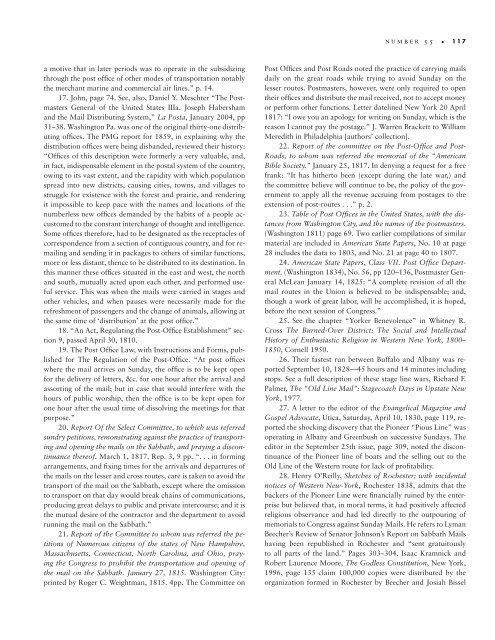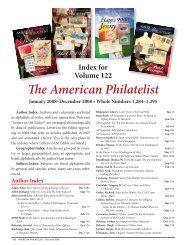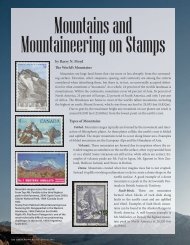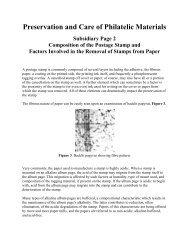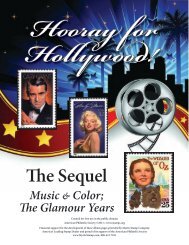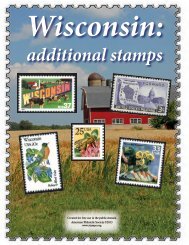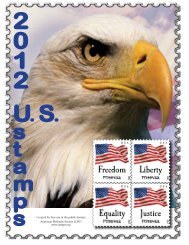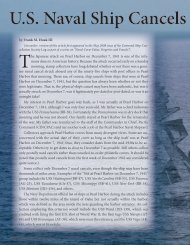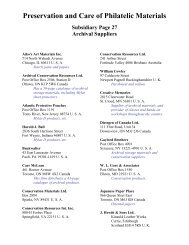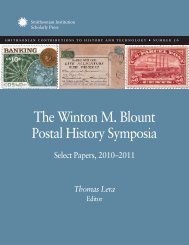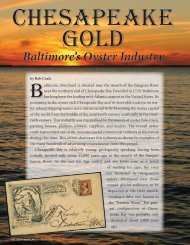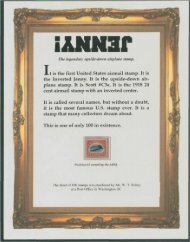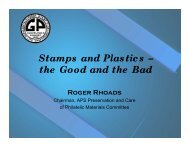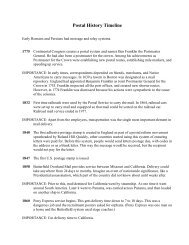The Winton M. Blount Postal History Symposia - Smithsonian ...
The Winton M. Blount Postal History Symposia - Smithsonian ...
The Winton M. Blount Postal History Symposia - Smithsonian ...
- No tags were found...
You also want an ePaper? Increase the reach of your titles
YUMPU automatically turns print PDFs into web optimized ePapers that Google loves.
n u m b e r 5 5 • 1 1 7a motive that in later periods was to operate in the subsidizingthrough the post office of other modes of transportation notablythe merchant marine and commercial air lines.” p. 14.17. John, page 74. See, also, Daniel Y. Meschter “<strong>The</strong> PostmastersGeneral of the United States IIIa. Joseph Habershamand the Mail Distributing System,” La Posta, January 2004, pp31–38. Washington Pa. was one of the original thirty- one distributingoffices. <strong>The</strong> PMG report for 1859, in explaining why thedistribution offices were being disbanded, reviewed their history:“Offices of this description were formerly a very valuable, and,in fact, indispensable element in the postal system of the country,owing to its vast extent, and the rapidity with which populationspread into new districts, causing cities, towns, and villages tostruggle for existence with the forest and prairie, and renderingit impossible to keep pace with the names and locations of thenumberless new offices demanded by the habits of a people accustomedto the constant interchange of thought and intelligence.Some offices therefore, had to be designated as the receptacles ofcorrespondence from a section of contiguous country, and for remailingand sending it in packages to others of similar functions,more or less distant, thence to be distributed to its destination. Inthis manner these offices situated in the east and west, the northand south, mutually acted upon each other, and performed usefulservice. This was when the mails were carried in stages andother vehicles, and when pauses were necessarily made for therefreshment of passengers and the change of animals, allowing atthe same time of ‘distribution’ at the post office.”18. “An Act, Regulating the Post- office Establishment” section9, passed April 30, 1810.19. <strong>The</strong> Post Office Law, with Instructions and Forms, publishedfor <strong>The</strong> Regulation of the Post- office. “At post officeswhere the mail arrives on Sunday, the office is to be kept openfor the delivery of letters, &c. for one hour after the arrival andassorting of the mail; but in case that would interfere with thehours of public worship, then the office is to be kept open forone hour after the usual time of dissolving the meetings for thatpurpose.”20. Report Of the Select Committee, to which was referredsundry petitions, remonstrating against the practice of transportingand opening the mails on the Sabbath, and praying a discontinuancethereof. March 1, 1817. Rep. 3, 9 pp. “. . . in formingarrangements, and fixing times for the arrivals and departures ofthe mails on the lesser and cross routes, care is taken to avoid thetransport of the mail on the Sabbath, except where the omissionto transport on that day would break chains of communications,producing great delays to public and private intercourse; and it isthe mutual desire of the contractor and the department to avoidrunning the mail on the Sabbath.”21. Report of the Committee to whom was referred the petitionsof Numerous citizens of the states of New Hampshire,Massachusetts, Connecticut, North Carolina, and Ohio, prayingthe Congress to prohibit the transportation and opening ofthe mail on the Sabbath. January 27, 1815. Washington City:printed by Roger C. Weightman, 1815. 4pp. <strong>The</strong> Committee onPost Offices and Post Roads noted the practice of carrying mailsdaily on the great roads while trying to avoid Sunday on thelesser routes. Postmasters, however, were only required to opentheir offices and distribute the mail received, not to accept moneyor perform other functions. Letter datelined New York 20 April1817: “I owe you an apology for writing on Sunday, which is thereason I cannot pay the postage.” J. Warren Brackett to WilliamMeredith in Philadelphia [authors’ collection].22. Report of the committee on the Post- Office and Post-Roads, to whom was referred the memorial of the “AmericanBible Society.” January 25, 1817. In denying a request for a freefrank: “It has hitherto been (except during the late war,) andthe committee believe will continue to be, the policy of the governmentto apply all the revenue accruing from postages to theextension of post- routes . . .” p. 2.23. Table of Post Offices in the United States, with the distancesfrom Washington City, and the names of the postmasters.(Washington 1811) page 69. Two earlier compilations of similarmaterial are included in American State Papers, No. 10 at page28 includes the data to 1803, and No. 21 at page 40 to 1807.24. American State Papers, Class VII. Post Office Department.(Washington 1834), No. 56, pp 120–136, Postmaster GeneralMcLean January 14, 1825: “A complete revision of all themail routes in the Union is believed to be indispensable; and,though a work of great labor, will be accomplished, it is hoped,before the next session of Congress.”25. See the chapter “Yorker Benevolence” in Whitney R.Cross <strong>The</strong> Burned- Over District: <strong>The</strong> Social and Intellectual<strong>History</strong> of Enthusiastic Religion in Western New York, 1800–1850, Cornell 1950.26. <strong>The</strong>ir fastest run between Buffalo and Albany was reportedSeptember 10, 1828—45 hours and 14 minutes includingstops. See a full description of these stage line wars, Richard F.Palmer, <strong>The</strong> “Old Line Mail”: Stagecoach Days in Upstate NewYork, 1977.27. A letter to the editor of the Evangelical Magazine andGospel Advocate, Utica, Saturday, April 10, 1830, page 119, reportedthe shocking discovery that the Pioneer “Pious Line” wasoperating in Albany and Greenbush on successive Sundays. <strong>The</strong>editor in the September 25th issue, page 309, noted the discontinuanceof the Pioneer line of boats and the selling out to theOld Line of the Western route for lack of profitability.28. Henry O’Reilly, Sketches of Rochester; with incidentalnotices of Western New- York, Rochester 1838, admits that thebackers of the Pioneer Line were financially ruined by the enterprisebut believed that, in moral terms, it had positively affectedreligious observance and had led directly to the outpouring ofmemorials to Congress against Sunday Mails. He refers to LymanBeecher’s Review of Senator Johnson’s Report on Sabbath Mailshaving been republished in Rochester and “sent gratuitouslyto all parts of the land.” Pages 303–304. Isaac Kramnick andRobert Laurence Moore, <strong>The</strong> Godless Constitution, New York,1996, page 135 claim 100,000 copies were distributed by theorganization formed in Rochester by Beecher and Josiah Bissel


